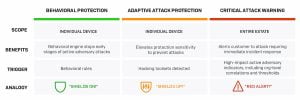Ransomware attacks continue to plague every sector of business. In July, a bank in US suffered a ransomware attack that resulted in the loss of 7.6 million records, as reported by TechCrunch. The evolving methods of ransomware gangs demonstrate that traditional security systems are no longer sufficient.
Many companies now face the challenge of managing security for geographically dispersed endpoints across various networks. Without centralized security, attackers can exploit security gaps within your systems. Therefore, endpoint security is crucial for addressing various cyber threats.
Learn what endpoint security is and how this solution can protect your company from damaging cyber-attacks like ransomware in this article
What is Endpoint Security?
Endpoint security refers to practices designed to protect endpoint devices, such as smartphones, tablets, desktops, laptops, servers, and Internet of Things (IoT) devices, from various cyber threats. Typically, endpoint protection includes comprehensive security software to handle threats such as malware attacks.
As cyber threats become more sophisticated, endpoint security platforms have evolved to keep pace. Today’s endpoint protections not only detect threats but also mitigate them immediately.
Here are five components of endpoint security and their functions:
- Device Protection: Monitors suspicious activity on each endpoint device
- Browser Protection: Filters web traffic to prevent endpoints from being easily hacked while on the network
- Network Control: Monitors and manages network traffic
- Application Control: Manages which applications are allowed or disallowed on the corporate network
- Data Control: Prevents data leakage through encryption features
Now that you understand these components, how does endpoint security work?
How Endpoint Security Works
Endpoint security operates by examining all files entering the network and comparing them to threat databases in the cloud. Administrators can then manage security across all connected devices through a centralized management console.
Security software is installed on each endpoint and configured to automate updates, authenticate login attempts, and enforce company policies. Through application control, endpoint security can prevent users from downloading or accessing unsafe or unauthorized applications and perform encryption.
Functions of Endpoint Security
Endpoint security not only protects your devices but also enhances remote work security. Here are four key functions:
1. Protect All Endpoint Devices
While working, you use various types of devices, not just a few endpoints. Therefore, it is essential for companies to protect all these devices from threats that could lead to data breaches.
2. Enhance Remote Work Security
Companies need to strengthen security when implementing remote working policies, as devices used remotely may be more vulnerable to exploitation by hackers. Endpoint security ensures that employee devices remain secure even when connected to the company network from afar.
3. Protection from Advanced Threats
As technology advances, attackers continuously update their attack models and methods. Using endpoint security helps protect against these advanced threats.
4. Protect Identity
When connecting to the corporate network through various devices across different locations, stricter authentication processes are needed to protect legitimate user identities from leaks and prevent unauthorized access.
Understanding the importance of endpoint security in protecting devices and company data from various threats, it is also crucial to compare how endpoint protection platforms stack up against traditional antivirus solutions.
Endpoint Protection Platforms vs. Traditional Antivirus
Antivirus software can detect, eliminate, and prevent malware from infecting endpoint devices. Typically, this solution is used directly on the device to scan files and detect patterns. However, antivirus can only recognize known threats and must be regularly updated to detect the latest malware.
On the other hand, endpoint protection provides superior protection across the entire business network, including every connected endpoint. This approach is more comprehensive, covering data loss prevention, fileless and signatureless malware, and phishing attacks.
Additional advantages of endpoint security include integration with the cloud and automatic updates, minimizing manual update processes. Furthermore, integrated endpoint security allows for comprehensive protection and control of all security aspects within a single platform.
What Are the Differences Between Enterprise and Consumer Endpoint Security?
As previously discussed, a comprehensive endpoint protection platform is crucial for securing devices, data, and information. This is especially critical for enterprises. So, what are the differences between endpoint security for enterprises and consumers? Here is a comparison table:
| Enterprise | Consumer |
| Manages various types of endpoints more effectively | Manages a limited number of single-user endpoints |
| Centralized security management software | Setup and configuration for each individual endpoint |
| Remote administration capabilities | Rarely requires remote management |
| Configures endpoint protection remotely | Configures endpoint protection directly on the device |
| Deploys patches to all relevant endpoints | User automates updates for each device |
| Requires modified permissions | Uses administrative permissions |
| Monitor employee devices, activities, and behavior | Activities and behavior known only to the user |
From the table above, endpoint protection for enterprises offers significant advantages, particularly for defending against malware attacks like ransomware that can strike at any time. Therefore, we recommend Sophos Intercept X Endpoint, a specialized endpoint protection solution that supports enterprise security.
Sophos Intercept X Endpoint for Enterprises
Sophos offers a leading endpoint security solution with comprehensive protection in one platform to prevent dangerous threats such as ransomware, breaches, and data loss. Prioritizing prevention, Sophos blocks all threats and uses advanced technology to prevent attack escalation, thereby reducing the workload for IT teams.
With a proven track record, Sophos has achieved top ratings and the most reviews in the Voice of the Customer Report for Endpoint Protection Platforms by Gartner in 2024. Sophos is also recognized as a top vendor in 11 industry sectors, a leader in IDC MarketScape 2024 for Modern Endpoint Security, and a pioneer in endpoint protection, EDR, XDR, firewall, and MDR.
Read More: Here’s Why Next-Generation Firewall Is Crucial for Your Network Security
The Intercept X solution from Sophos is easy to deploy and use, even for IT teams with limited resources. This integrated security platform is also more cost-effective, as it eliminates the need for different solutions for each endpoint. Most importantly, Intercept X is globally used across various industries, ensuring its security credentials.
Advantages of Intercept X Endpoint
Figure 1. Industry-leading technology that automatically adapts to protect system against threats and hands-on-keyboards attacks.
Here are some advantages of Intercept X:
- Detection and Prevention of Latest Threats: Uses deep learning to detect and block unknown threats
- Anti-Ransomware Protection: Utilizes CryptoGuard technology to stop damaging ransomware attacks
- Exploit Prevention: Prevents exploitation of vulnerabilities, including zero-day threats without vendor patches
- Data Loss Prevention (DLP): Protects data from unauthorized access and prevents data breaches
- Centralized Management: Monitors and manages all devices from a centralized console
- Reduced IT Workload: Automates threat detection and response to lessen IT team workload
- Seamless Integration: Easily integrates with other security solutions
- User-Friendly: Intuitive interface and easy setup for new users
- Cost-Effective: Reduces Total Cost of Ownership (TCO) by minimizing the number of required solutions
- Scalable: Easily scales with business growth
Key Features
Here are the key features of Intercept X Endpoint:
- Deep Learning Technology: Uses deep learning to detect threats predictively, tracking malware without relying on signatures
- Anti-Ransomware: CryptoGuard protection in Intercept X stops harmful encryption in real-time, keeping infected files secure
- Exploit Prevention: Prevents attacks on application vulnerabilities and protects against zero-day and other advanced threats
- Endpoint Detection and Response (EDR): Provides comprehensive visibility of vulnerabilities and helps IT teams investigate incidents quickly
- Integrated Security: Integrates with other Sophos products for comprehensive protection with real-time threat intelligence sharing
- Centralized Management: Optimizes endpoint security management with Sophos Central, offering automatic reporting, real-time alerts, and easy policy management
Get Intercept X Endpoint Only at Virtus
Start using Sophos‘s endpoint security solution to enhance your enterprise’s endpoint protection. The experienced and certified team at Virtus Technology Indonesia (VTI) will assist you in implementing Intercept X Endpoint from consultation to maintenance and after-sales support to avoid trial and error.
Consult now with the Virtus team via the following link.
Author: Anggita Olivia Herman – Content Writer CTI Group




























